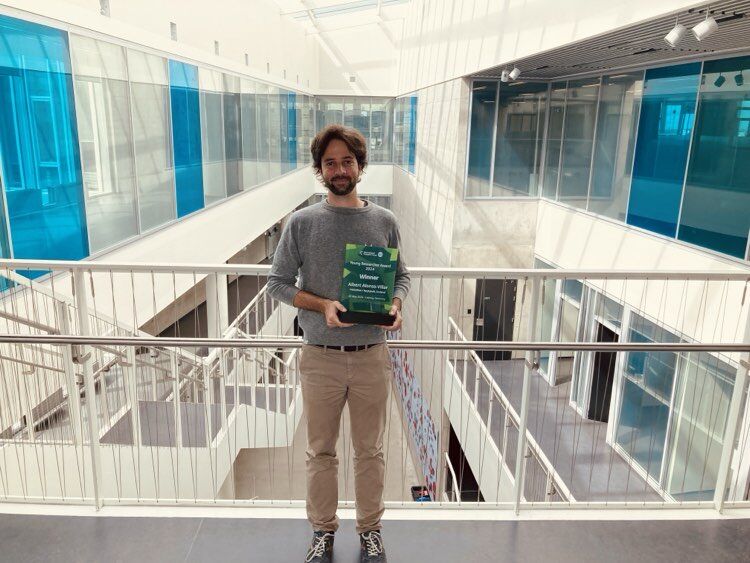Young researcher of the year
PhD student in engineering at RU receives an award

Albert Alonso-Villar a PhD student in engineering at Reykjavík University, here holding his Young Researcher of the Year Award.
Albert Alonso-Villar, a PhD student in engineering at Reykjavik University, recently received the Transport Forum's (ITF) 2024 Young Researcher of the Year Award for his research on the effects of cold climates on heavy-duty vehicles powered by batteries. The PHD project focuses on transitioning from fossil fuels to a better alternative within the Icelandic heavy-duty vehicles transport sector. Albert is now on the verge of finishing his third paper researching various aspects of the transition.
During the first paper, we analyzed alternative fuels that could replace fossil fuels in freight transport in Iceland, such as battery-electric, hydrogen, and biofuel powertrains. We looked at the different trucks' CO2 emissions, operating costs, impact on energy security, and overall technical feasibility. The results suggested that battery-electric trucks made the most sense. The question remained whether this would be technically feasible in Iceland due to the harsh weather conditions. In the second paper we cooperated with Ölgerðin and used their fleet as case study. We investigated the trucks performance under various weather conditions, including worst-case scenarios with low-temperatures, headwind, high payloads and so forth, to see if electric trucks could meet Ölgerðin's activity and how much charging sessions they would need during the day, if any. Currently we are working on the third paper researching opportunities on longer routes i.e. to Vestfirðir which is quite a complicated area both concerning weather and landscape. The final paper will be dedicated to applying our model to the whole island and figuring out how that would impact the power grid.
He stresses that many solutions are already available and therefore no need to wait for a miraculous technology like hydrogen or nuclear fusion to start taking action.
The core of the transition is not as technical as we think but it has a lot of social aspects to it. For instance, switching all the cars to electric cars won't solve anything, since a car can't never be fully sustainable. We need to look for alternative transportation modes- we don't want an electric car, we want to get from A to B. Re-thinking the model of private mobility (i.e. passenger cars) and heavily investing in public transport or car-sharing services would be way more effective against climate change.
While waiting for a PHD position to open up in RU Albert started his PHD studies in Barcelona. He had done an internship during his master's studies in Austurbrú in Egilsstaðir and always hoped to come back to Iceland.
My master's was in engineering in sustainable cities covering topics such as waste management and energy planning. My internship was my first contact with proper research in an institution and I loved working there and living in Iceland. I was happy to get back and gain expertise and knowledge by focusing on energy transition in heavy-duty transport here in Iceland.

